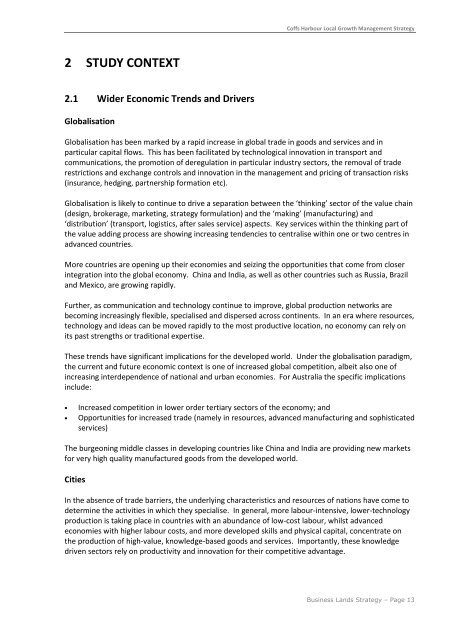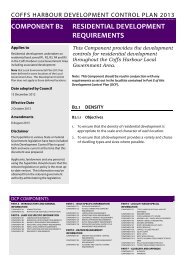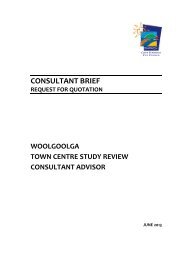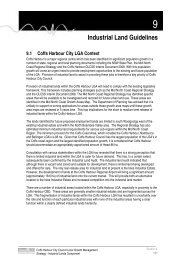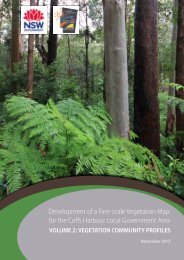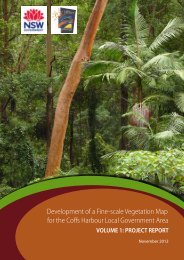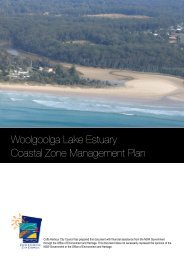Business Lands Strategic Plan - Coffs Harbour City Council - NSW ...
Business Lands Strategic Plan - Coffs Harbour City Council - NSW ...
Business Lands Strategic Plan - Coffs Harbour City Council - NSW ...
You also want an ePaper? Increase the reach of your titles
YUMPU automatically turns print PDFs into web optimized ePapers that Google loves.
<strong>Coffs</strong> <strong>Harbour</strong> Local Growth Management Strategy<br />
2 STUDY CONTEXT<br />
2.1 Wider Economic Trends and Drivers<br />
Globalisation<br />
Globalisation has been marked by a rapid increase in global trade in goods and services and in<br />
particular capital flows. This has been facilitated by technological innovation in transport and<br />
communications, the promotion of deregulation in particular industry sectors, the removal of trade<br />
restrictions and exchange controls and innovation in the management and pricing of transaction risks<br />
(insurance, hedging, partnership formation etc).<br />
Globalisation is likely to continue to drive a separation between the ‘thinking’ sector of the value chain<br />
(design, brokerage, marketing, strategy formulation) and the ‘making’ (manufacturing) and<br />
‘distribution’ (transport, logistics, after sales service) aspects. Key services within the thinking part of<br />
the value adding process are showing increasing tendencies to centralise within one or two centres in<br />
advanced countries.<br />
More countries are opening up their economies and seizing the opportunities that come from closer<br />
integration into the global economy. China and India, as well as other countries such as Russia, Brazil<br />
and Mexico, are growing rapidly.<br />
Further, as communication and technology continue to improve, global production networks are<br />
becoming increasingly flexible, specialised and dispersed across continents. In an era where resources,<br />
technology and ideas can be moved rapidly to the most productive location, no economy can rely on<br />
its past strengths or traditional expertise.<br />
These trends have significant implications for the developed world. Under the globalisation paradigm,<br />
the current and future economic context is one of increased global competition, albeit also one of<br />
increasing interdependence of national and urban economies. For Australia the specific implications<br />
include:<br />
• Increased competition in lower order tertiary sectors of the economy; and<br />
• Opportunities for increased trade (namely in resources, advanced manufacturing and sophisticated<br />
services)<br />
The burgeoning middle classes in developing countries like China and India are providing new markets<br />
for very high quality manufactured goods from the developed world.<br />
Cities<br />
In the absence of trade barriers, the underlying characteristics and resources of nations have come to<br />
determine the activities in which they specialise. In general, more labour-intensive, lower-technology<br />
production is taking place in countries with an abundance of low-cost labour, whilst advanced<br />
economies with higher labour costs, and more developed skills and physical capital, concentrate on<br />
the production of high-value, knowledge-based goods and services. Importantly, these knowledge<br />
driven sectors rely on productivity and innovation for their competitive advantage.<br />
<strong>Business</strong> <strong>Lands</strong> Strategy – Page 13


